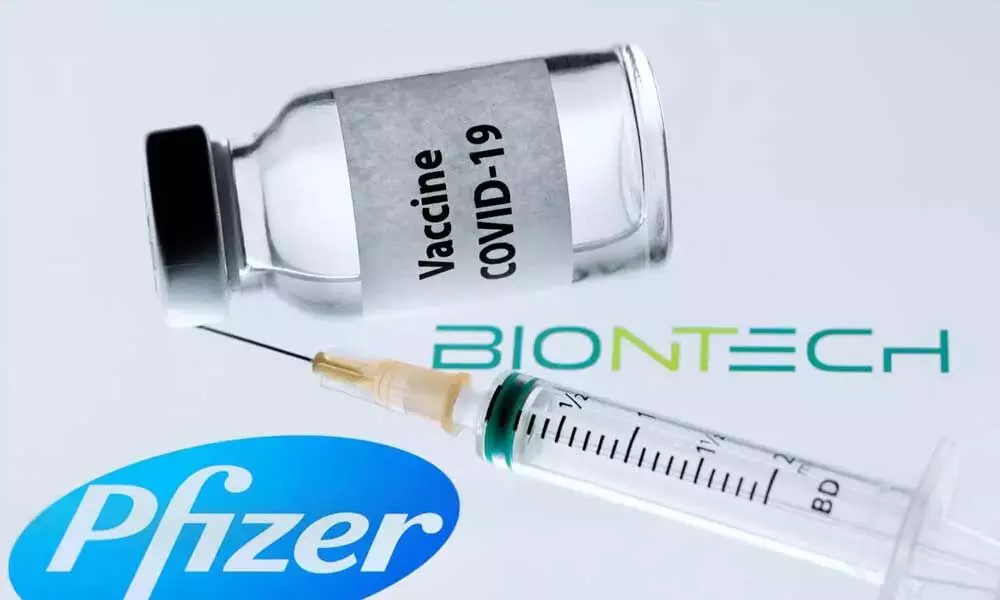UK to Brexit-proof Pfizer vaccine supplies from Belgium

Pfizer vaccine
Britain said on Monday that plans are being put in place to ensure the transportation of the Pfizer/BioNTech vaccine against COVID-19
London: Britain said on Monday that plans are being put in place to ensure the transportation of the Pfizer/BioNTech vaccine against COVID-19 is not affected in the event of no agreement being clinched with the European Union by the end of the Brexit transition period on December 31. The first vaccine doses have been arriving from Pfizer's manufacturing site in Belgium after the UK's independent regulator gave the official go-ahead for its rollout from this week.
However, the bulk of the supply is expected in the New Year and the UK's Road Haulage Association has warned that a failure to agree an EU-UK post-Brexit trade deal by the end of this month could see "significant disruption" to the flow of goods for many months. "We have looked at use of non-commercial flights, we've got border arrangements in place," Foreign Office minister James Cleverly told UK media outlets in reference to Brexit-proofing vaccine supplies.
This could "potentially" involve the armed forces being deployed if required, as the minister added: "This is such an important product, it's probably perhaps the most important product, so we will look to ensure that those supplies are available in the UK in whatever circumstance." The UK and EU are locked in last-ditch efforts to try and thrash out an agreement that can be ratified by all 27 EU members before the December-end deadline. Significant differences over fishing rights and business competition rules remain the main stumbling blocks but both sides have said there is still time to agree a pact, with Prime Minister Boris Johnson and European Commission President Ursula von der Leyen set for crunch talks again this week.
If both sides fail to reach an agreement, it would mean import duties and delays on the border for most goods. "Everyone understands the significance of vaccines," said Cleverly, in reference to concerns over the crucial shipment from across the border. The vaccine is typically delivered by a simple injection in the shoulder but there is a complex and difficult logistical challenge to deliver from the manufacturers Pfizer to patients. It needs to be stored at -70C before being thawed out and can only be moved four times within that cold chain before being used. Defrosting the vaccine takes a few hours and then additional time is required to prepare the vaccine for administering. The Department of Health and Social Care (DHSC) said that National Health Service (NHS) staff have been working round the clock to prepare secure sites and accept deliveries.
Each box needs to be opened and unpacked manually, and temperature data has to be downloaded from each box. Tracking data covering every box's journey from Belgium is also being downloaded to check that the vials have been kept well below freezing. There are five packs of 975 doses per box and only sites with the necessary Medicines and Healthcare products Regulatory Agency (MHRA) licence can split the vaccine packs. Once all checks are complete, the vaccine will be made available to order by authorised sites in the state-funded NHS. The distribution of the vaccine across the UK is being undertaken by Public Health England and the NHS in England, Scotland, Wales and Northern Ireland through systems specially adapted from those used successfully for the national immunisation programmes, the government said.
Around 800,000 doses of the vaccine are expected to be available in the UK from this week. In all, the government has ordered a total of 40 million doses – enough to vaccinate 20 million people, with two shots each, 21 days apart. Patients aged 80 and above who are already attending hospital as an outpatient, and those who are being discharged home after a hospital stay, will be among the first to receive the "life-saving jab". Hospitals will also begin inviting over 80s in for a jab and work with care home providers to book their staff in to vaccination clinics. Any appointments not used for these groups will be used for healthcare workers based on the Joint Committee on Vaccination and Immunisation's (JCVI) phased list of recipients based on the risk of death from the deadly virus.







